On Wednesday night, the two final candidates in France’s presidential election—centrist Emmanuel Macron and far-rightist Marine Le Pen—faced off in a two-and-a-half-hour televised debate, less than four days before the final round on May 7. The highly combative exchange delivered little by way of content.
The times they are a-changin’
In 2002, former President Jacques Chirac refused to debate Le Pen’s father (and predecessor as leader of the Front National) Jean-Marie Le Pen in a similar debate. He thought the move would help him gain more votes, and it paid off: Chirac was re-elected with 82.2 percent of the vote.
This time, the situation is quite different—for one, Macron is a relative newcomer to politics and could not afford to sit out the debate. More broadly, most polls expect Marine Le Pen to perform better than her father. France faces many difficulties, from continuing unemployment to terrorist threats at home, and more. Many French voters blame the European Union, globalization, and immigration. Le Pen’s simplistic, anti-immigrant message has proved fairly popular: In the first round, she won 21.3 percent of the votes (against Macron’s 24.1 percent) and is expected to attract a substantial number of voters from the traditional parties, Les Républicains (center-right) and the Parti socialiste (center-left). Although polls indicate that she stands little chance of winning on Sunday, some show that she could gather up to 41 percent of the votes.
Fighting words
Le Pen attacked Macron from beginning to the end, and had little to say about how she would solve France’s economic problems, especially with regard to unemployment. Extremely critical of the European Union, she suggested her opponent is a puppet of Germany’s, saying: “On Sunday, in any case, France will be led by a woman, either myself or Angela Merkel.” But her anti-European plans weren’t clear: On one hand, she said she would propose institutional changes so that France wouldn’t have to obey EU law anymore; on the other, a referendum on the EU membership seems a remote possibility, since polls show that 67 percent of French citizens want to remain in the union.
An exchange about the euro was an awkward moment for Le Pen, who claimed that she had not fully decided whether her government would try to exit the common currency. She said that France would reverse to the old French franc domestically and keep the euro for its international trade and finance. Macron, the former economy minister, quickly fired back that such a plan would be catastrophic for French citizens and companies: “A farmer will buy his products in euros, but he will pay his workers in Francs? How does that work?”
Le Pen launched invectives against Macron, calling him “the candidate of finance, money, and globalization” and “Hollande Jr.,” and accusing him of being “the candidate of selling off France” following his two-year stint as economy minister under outgoing president François Hollande, who remains highly unpopular.
For his part, Macron—who did manage to present his program more extensively during the debate—accused his opponent of lying and flip-flopping, challenging her anti-establishment credentials by saying she is “the heir to a party which has been around for four decades.” At times, he sounded a bit like a teacher, while Le Pen would laugh and wave her hands instead of answering his questions. He said she represents “the spirit of failure” against his own “spirit of conquest,” declaring: “if she were elected, the world would not look at France in a nice way.” It’s hard to disagree.
France and the world
Throughout the strikingly aggressive debate, no more than 15 minutes were spent on international affairs. Asked how they would deal with America’s Donald Trump and Russia’s Vladimir Putin, the two candidates offered different responses: Le Pen claimed she would be “best placed” to deal with Trump, Putin, and Indian Prime Minister Narendra Modi, but did not say a word on trans-Atlantic relations.
On the Russian leader, Macron said that he would “not be subject to the orders of Mr. Putin,” although he would “try to find a solution on Syria” (the only time that country was mentioned in the debate). As for dealing with the U.S. president, he insisted he would maintain a close cooperation with Trump, especially on security issues and in the United Nations Security Council, and said he would “try to convince Trump to work together on climate change.” Not an easy path, considering recent statements from Washington.
Wait and see
For those who followed the 2016 U.S. presidential debates, last night’s exchange brought a sense of déjà vu. There has never been such a brutal dialogue between two candidates for the highest office in France. The debate should have been a rich opportunity for French democracy, with the two candidates explaining their programs for the next five years. Instead, it was a rather unsubstantial boxing match.
Macron came across as detail-oriented, while Le Pen spoke aggressively and largely in generalities (except on domestic security and immigration, her trademark subjects). Akin, in some ways, to the final debate between Donald Trump and Hillary Clinton, Wednesday’s debate in France was more about ideology and rhetoric than about policy substance.
Voters go to the polls on Sunday to make their choice, and the presidential election will be followed in June by parliamentary ones. Many in France and around the world—including in the United States, a key ally—are hoping for a more rational policy debate once the horserace is over.

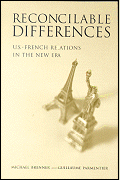
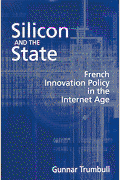
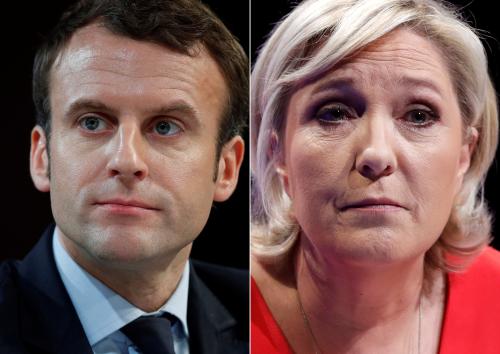

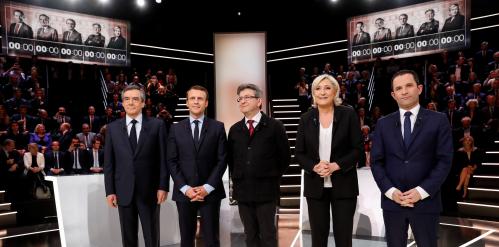


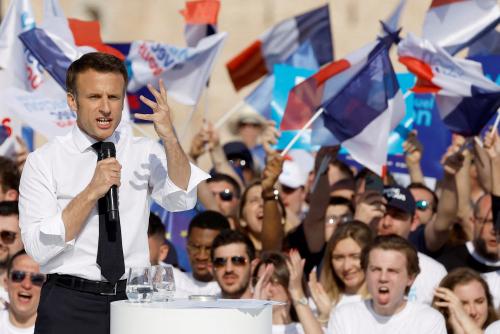
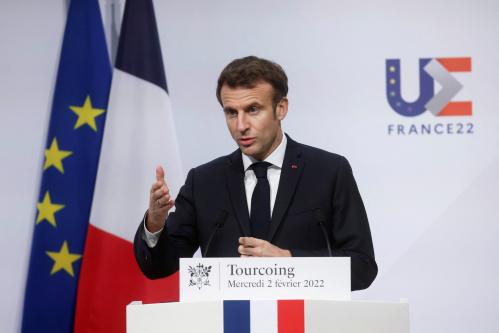
Commentary
A bloody final debate between Macron and Le Pen as France heads toward election runoff
May 4, 2017